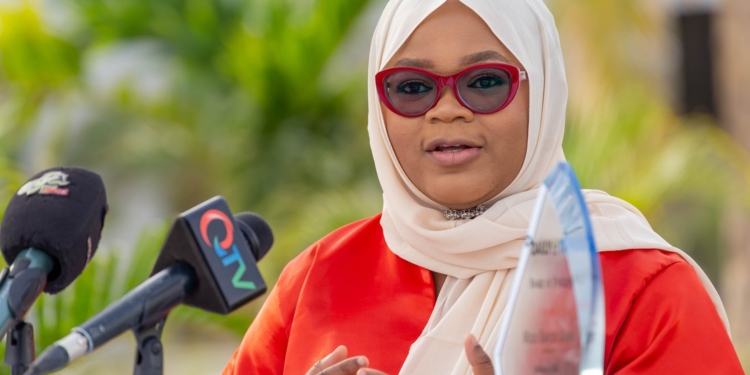Few organisations in The Gambia have made as significant an impact on the lives of young women and girls as Think Young Women (TYW), a non-profit organisation that advocates the rights and development of these groups. Its efforts aim to break down the societal and cultural barriers that limit their potential.
Established in 2010, TYW seeks to inspire and assist girls and young women achieve their individual needs and collective interests by developing their leadership skills and empowering them through capacity building, awareness raising, networking, and mentorship.
The organisation works at the national level, targeting individuals throughout The Gambia. Its programmes are centred around encouraging and championing young women to learn and share their stories and experiences while inspiring them to take their ideas beyond their local communities. It emphasises nurturing and helping young women to develop, preparing them for local and global leadership, and building bridges and a network of solidarity as seasoned women leaders and even as mentors to others.
Speaking to Journalists For Justice (JFJ), Musu Bakoto Sawo, TYW’s National Coordinator, stated that the organisation’s vision is to create a network of young women in The Gambia empowered to take action on issues they care about and become agents of change in their communities.
“Through alliances with local, regional, and international organisations, we strive to promote participation, peace, conflict resolution, and volunteerism among women. By nurturing and mentoring these young women, we are cultivating a culture of learning and strengthening a multi-generational network of women leaders,” said Sawo.
TYW works with girls from all socio-economic backgrounds, including those from rural areas, who often lack access to essential services and opportunities for development.
This, however, poses one of TYW’s biggest challenges: backlash. This is partly because the issues the organisation seeks to address are considered either sensitive or a challenge to social norms, although TYW sees them as an impediment to women’s rights.
“Patronisation is yet another challenge. We often get the impression from certain stakeholders that we are too young to engage meaningfully or are too young to have the right competencies to implement certain projects and programmes,” commented Sawo.
You Might Also Like: Foundation is doing what Solo Sandeng died doing: Standing up to injustice
She added that many young people, particularly young women, continue to discount such misconceptions, demonstrating that they are active members of their society and play a key role in its development.
However, she is quick to point out that all is not lost and that there is hope.
“Although these sometimes limit our access to local funding opportunities, the narrative is changing,” she said.
While patriarchy remains a challenge in The Gambia, there is growing evidence that progress is being made toward fighting it. This is manifested in behavioural change towards the system and other socio-cultural norms that impact gender equality. This could be attributed to the growing inclusion of some communities in developing interventions, resulting in their taking ownership of these initiatives and influencing positive change.
Think Young Women has implemented several initiatives to support the advancement of women and girls. In 2011, it welcomed the first class of its school-based girls’ mentorship programme, which is designed to inspire them to be active participants in their communities, equip them with interpersonal and communication skills, and build their self-esteem.
The programme has been expanded to rural communities with the help of trained regional mentees to implement and sustain it. The UNFPA has supported it over the years.
TYW is also involved in other initiatives, including capacity-building for female political leaders on leadership skills and peacebuilding. It has also worked with artists and poets to raise awareness about female genital mutilation (FGM) and child marriage.
Other initiatives include the National Drama and Debate Competitions on Domestic Violence and Sexual and Reproductive Health and Rights for School Children, storytelling, and training of traditional communicators, and voter registration campaigns. TYW has also supported other organisations in developing communication strategies for effective results.
It uses this comparative advantage to contribute to national initiatives such as the 16 Days of Activism and the International Women’s Day.
Its activities have been recognised nationally and internationally as critical resources for liberating women and girls.
TYW’s most significant advocacy achievement was the ban on FGM and child marriage. It was also involved in the transitional justice process in The Gambia, being the first women-led organisation to start work on the Truth, Reconciliation and Reparations Commission (TRRC) even before its formation. It conducted nationwide consultations with women and girls on transitional justice and launched safe spaces where they could recount their stories as victims of the regime of former President Yahya Jammeh.
“TYW also implemented a project to strengthen the inclusive participation of rural communities in The Gambia’s TRRC and supported the commission in statement-taking to increase the number of women who testified during the public hearings,” said Sawo.
She added that the organisation also established community support networks across the country to provide psychosocial support to women victims and survivors.
Additionally, TYW conducted engagements on transitional justice and the work of the TRRC with senior schools and popularised the commission’s report and the government’s White Paper.
TYW also designed and implemented a project on “Advancing the reparations agenda through locally centred knowledge” with support from the International Centre for Transitional Justice (ICTJ). The objective was to ensure that women and girls were fully represented in the transitional justice process, and that their needs were addressed as the country moved towards democracy.
Sawo has some advice for other organisations in the sector in which TYW operates: Never agree to be intimidated, however small you are. She insists that the dream of seeing a Gambia where women and girls will live a meaningful life is not out of reach.
“It is possible, and our collective efforts, the amplification of our voices, and partnering where possible will help us get there,” she said.






